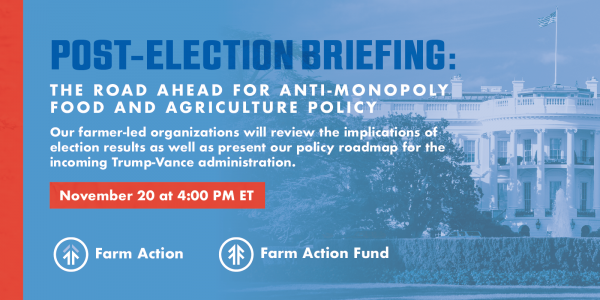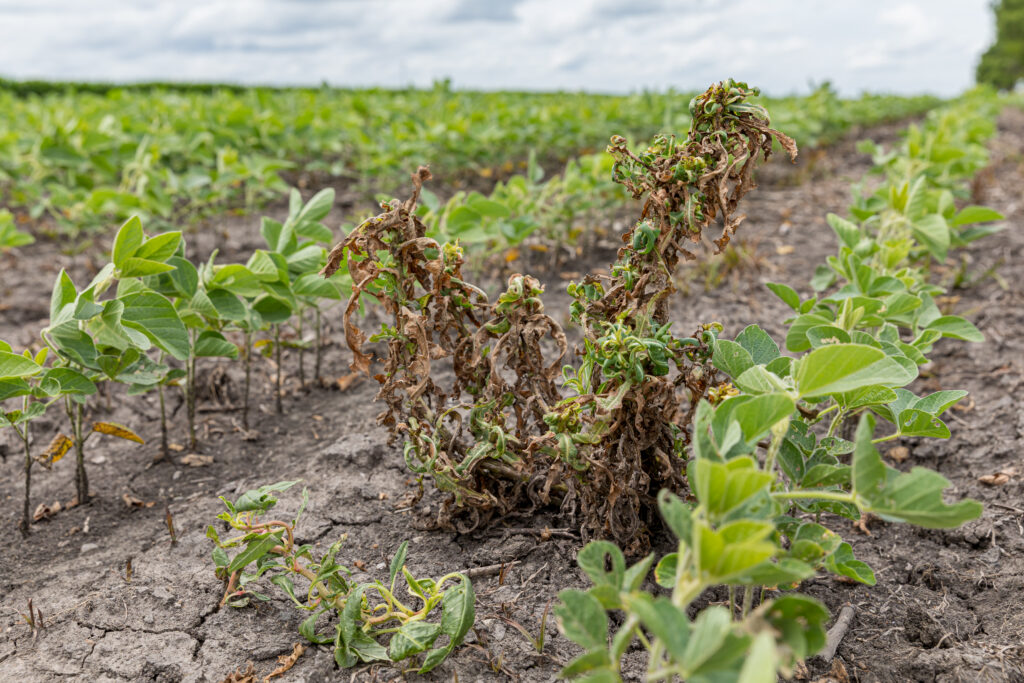As the saying goes, “Change is the only constant.” Former President John F. Kennedy once said, “Change is the law of life. And those who look only to the past or present are certain to miss the future.”
Tuesday’s election brought notable changes to Washington, D.C.: Donald Trump will return to the White House, and the U.S. Senate will shift to Republican control. While key results are still coming in, here’s our initial take on what the 2024 election could mean for the movement toward fair competition in food and agriculture.
The New Landscape in Washington, D.C.
U.S. Senate
As of today, the final makeup of the U.S. Senate remains unknown, but it’s clear that control has flipped from Democratic to Republican. With Senator Mitch McConnell (R-KY) stepping down, Republican Senators will choose a new Majority Leader, with candidates reported to include Senators Thune (R-SD), Cornyn (R-TX), Scott (R-FL), and Barrasso (R-WY).
The Senate Agriculture Committee will see changes as well. With Republicans taking control, Committee Ranking Member Boozman (R-AR) is expected to assume the chair, while retiring Chair Stabenow (D-MI) is expected to be replaced by Senator Klobuchar (D-MN) as the top Democrat on the Committee. Senator Boozman’s past policies – including his Farm Bill framework released earlier this year – align closely with Big Ag interests, while Senator Klobuchar, although supportive of many antitrust issues, has historically been hesitant to confront corporate power in the food and agriculture sectors.
Additionally, the defeat of Senator Sherrod Brown (D-OH), a champion of local and regional food systems, and Senator Jon Tester (D-MT), the Senate’s only active farmer, will be felt, even though Tester wasn’t on the Agriculture Committee. These shifts introduce uncertainty regarding the future of food and agriculture antitrust reforms. We remain committed to educating policymakers on the abusive power of corporate monopolies in the food system and pushing for the necessary protections for farmers, ranchers, and rural communities.
U.S. House of Representatives
The outcome of several uncalled House contests will determine which party controls the U.S. House of Representatives. If Republicans retain control, it seems certain Speaker Johnson (R-LA) and Agriculture Committee Chair Thompson (R-PA) are likely to keep their positions. If Democrats gain control, Hakeem Jeffries (D-NY) could become Speaker, though it’s uncertain who would lead the Agriculture Committee. Notably, nine Agriculture Committee races are still undecided, and three members won’t return, including Reps. Molinaro (R-NY), Spanberger (D-VA), and Slotkin (D-MI) (Slotkin has won Stabenow’s vacated Senate seat).
The new Congress won’t convene until January 2025, and with final results still coming in, it’s too early to make a concrete assessment of how the election will impact food and agriculture antitrust efforts. However, the future of our Farm Bill priorities depends heavily on these outcomes. For those interested in understanding how Congress reorganizes, we recommend the article, “A New Congress: A New Beginning.”
U.S. Department of Agriculture
Once in office, President-Elect Trump will make nearly 4,000 political appointments, including 15 cabinet members that must be confirmed by the Senate. The USDA Secretary, though typically among the last cabinet appointments, will be crucial to our efforts. There is much speculation about who will be appointed to lead the “People’s Department,” a term President Lincoln used to describe USDA after its creation.
In a recent blog post, Joel Salatin wrote he has accepted one of six “Advisor to the Secretary” spots, and indicated that Rep. Thomas Massie may be considered for the Secretary position. Rep. Massie has been a strong ally on many of our issues and we are glad to see his name in the mix. Others reported by Politico to be in the mix are Texas Agriculture Commissioner, Sid Miller; Co-Chair of Farmers and Ranchers for Trump, Kip Tom; and former USDA Under Secretary for Trade and Foreign Agricultural Affairs, Ted McKinney. Sid Miller and Kip Tom have shown signs that they would be open to some of our work. While President-Elect Trump has indicated that Robert F. Kennedy, Jr. will have a substantial role in health and food safety policy, it does not appear that he is in contention for the Secretary nomination.
Despite President-Elect Trump’s commitment to draining the swamp, his reported choice of once again including Brian Klippenstein on the USDA transition team is concerning due to Klippenstein’s close ties with Big Ag and his work with trade and lobbying groups that have historically co-opted commodity checkoff funds. The National Cattlemen’s Beef Association, which receives nearly 70% of its budget from checkoff funds, has already urged the incoming administration to “execute a hard reset” on all of the Biden administration’s competition reforms, which includes dismantling new Packers and Stockyards Act protections for farmers and ranchers. We will vigorously oppose any efforts to repeal these vital protections.
Rough Waters Ahead for Antitrust Enforcement?
During his first term, President Trump’s administration swiftly rolled back Obama-era protections for livestock producers under the Packers and Stockyards Act, designed to guard against unfair practices by large corporations. With Brian Klippenstein, who led USDA planning in 2016, now returning to Trump’s team, there are concerns that Biden-era advancements under the Act could face similar rollbacks.
In a notable move in 2017, then President-Elect Trump met with Bayer and Monsanto executives days before taking office, signaling support for their high-profile agrochemical merger. However, this hands-off approach changed course when conservative voices raised alarms over the tech sector’s perceived alignment with progressive causes. In response, Trump’s Department of Justice (DOJ) pursued legal action against Google, while the Federal Trade Commission (FTC) filed a suit against Facebook. Today, as scrutiny builds around high-stakes deals such as the Kroger-Albertsons merger and antitrust cases like that against Agri Stats — an agriculture tech platform — uncertainty looms over their future.
And in late October 2024, Judiciary Committee Chair Jim Jordan (R-OH) released a report accusing FTC Chair Lina Khan of “weaponizing” the agency against Elon Musk, a figure Trump has praised as a “super genius.” Musk, in turn, signaled that if Trump assumes office, Khan’s removal will be a priority. Chair Khan’s tenure has been marked by historic steps to counter corporate consolidation across various sectors, and her potential ouster could be a significant setback for efforts to rein in corporate power.

Opportunities for Antitrust Legislation in the Cattle Market
A reasonable opportunity has emerged for advancing antitrust legislation, particularly in the cattle market.
Although Democrats in the Senate have been more vocal on antitrust reform, bipartisan initiatives open the door for legislative action in the new Congress. Notably, Senator Josh Hawley (R-MO) introduced the Strengthening Antitrust Enforcement for Meatpacking Act (S.2818) with Senator Elizabeth Warren (D-MA), and we will work to promote this bill in the new Congress.
Senator Chuck Grassley (R-IA), a leader on cattle market competition and member of the Agriculture Committee, has advanced the 50/14 Spot Market Protection Act. We strongly support his ongoing efforts.
Additionally, Senator John Thune (R-SD), who is vying for Senate Majority Leader, has sponsored the Cattle Price Discovery and Transparency Act (S.228) and has previously pushed for Senate review of beef market practices. If successful, his leadership could further prioritize these antitrust issues in the Senate.
A Focus on Shutting the Revolving Door and Supporting a Healthy Food System
Robert F. Kennedy, Jr. is set to play a key role in food and health policy within the Trump administration. He has said as recently as Wednesday that he will shut the revolving door between corporations and government regulatory agencies, and support regenerative agriculture to combat the epidemic of chronic disease and reduce carbon emissions.
If Kennedy is able to follow through, we see potential to advance our Food, Not Feed campaign to bring healthy, safe food grown by U.S. farmers to our neighbors and local communities. Currently, the majority of taxpayer-funded agriculture programs support monoculture production of corn and soybeans as cheap industrial feed for corporate-controlled livestock operations, as well as the production of unhealthy processed foods and seed oils. As a result, our country’s food sovereignty has been eroded, we import too many of the fruits and vegetables we consume, and we are now left with a ballooning agricultural trade deficit. This backwards system exists for a reason: the multinational corporations that profit from this “Feed-Meat Complex” have captured the government agencies that dole out taxpayer subsidies, ensuring they flow into their own pockets to the detriment of America’s farmers and eaters. A shift in resources toward healthier, domestically produced food — including fruits, vegetables, and regeneratively raised livestock — could improve access to nutritious food and bolster American health outcomes.
Proposed Tariffs Will Make Winners and Losers
While we continue to oppose President-Elect Trump’s tariff proposal of up to 20% across the board, as much as 60% on all Chinese imports, and 200% on John Deere components and equipment manufactured in Mexico, we see that there will be both losers and winners.
Broad-based tariffs are a tax on the consumer or a cost to the U.S. business importing the goods. As discussed in Farm Action’s blog, in today’s highly concentrated global markets, farmers can expect to pay more for their tractors, trucks, electronics, and fertilizer as a result of this plan.
However, a select group of farmers stand a chance to benefit from the proposed tariffs. With meatpackers using their ability to import beef to put downward pressure on the domestic cattle market, a tariff would give U.S. cattle producers some needed protection. As Farm Action has reported, the United States has become more and more dependent on imported fruits and vegetables. President-Elect Trump’s tariff proposal would provide additional protection for U.S. fruit and vegetable producers, allowing them to grow their production to meet the U.S. demand. This would be a win for our Food, Not Feed campaign and help balance the U.S. agriculture trade deficit.
We will push the new administration to use tariffs only where they make strategic sense, advancing either an emerging U.S. industry or farmers and ranchers under market pressure from imported goods.
What’s Next?
The Biden-Harris administration took historic action to bring fair competition to food and agriculture. These policies have begun to level the playing field for America’s farmers and ranchers, and we will work to keep them in place. Heeding John F. Kennedy’s advice, we will not miss the future by only looking to the past or present.
The Trump campaign made commitments to farmers, ranchers, consumers, and families for a better food system. We will soon submit a policy roadmap to the Trump transition team, and work to ensure they deliver on their promises. To provide more information and to build momentum for our work, we will be hosting a webinar on November 20, 2024. We hope you will join us.
As a nonpartisan organization, we fight corporate monopolies and work to hold government accountable no matter who is in office. Regardless of change in Washington, D.C., we will stay focused on our mission to deliver a fair, healthy, and sustainable food and agriculture system.
Written by Joe Maxwell, edited by Christian Lovell and Angela Huffman, data by Sarah Carden.




